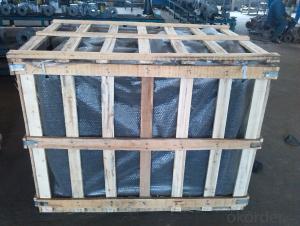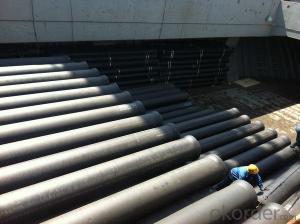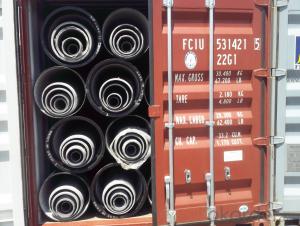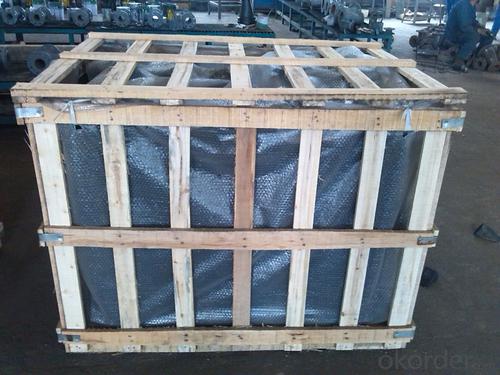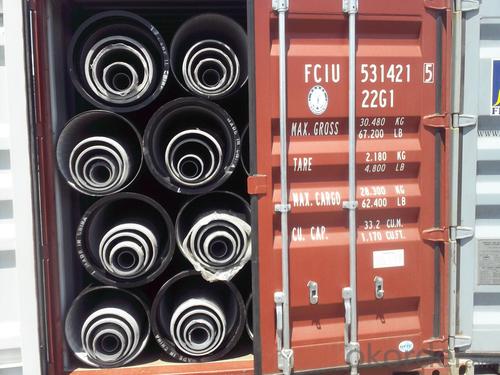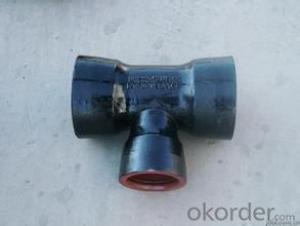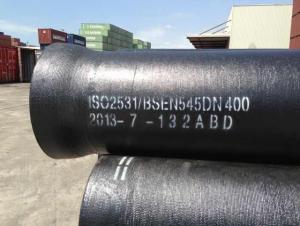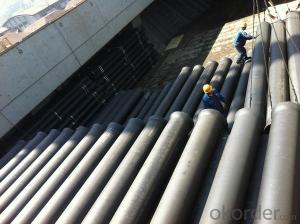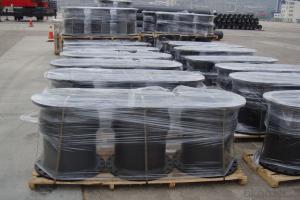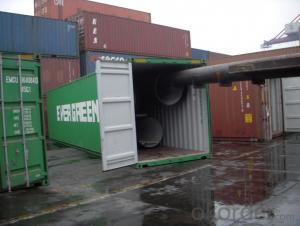DUCTILE IRON PIPE C DN 700
- Loading Port:
- Tianjin
- Payment Terms:
- TT OR LC
- Min Order Qty:
- -
- Supply Capability:
- 30000Tons m/month
OKorder Service Pledge
OKorder Financial Service
You Might Also Like
CNBM ductile iron pipe ranges from DN80-DN1600mm (T-Type, Class K9), effective length 6m, comply with ISO2531 Standard
Company Profile
CNBM International Corporation is the leading production base and renowned supplier of Ductile Iron Water Pipe systems of both potable and waste water in China. We are constantly looking to develop high quality products to ensure the longest service life and wonderful performance.
CNBM Pipelines regard quality as the essential factor leading to successful business. Every pipe is tested in accordance with BS EN545 (water application) or BS EN598 (sewer application). CNBM Pipelines products comply with and are tested according to the relevant European and International Standards. Our pipes are manufactured under the quality management system BS EN ISO 9001. After years of efforts, CNBM Pipelines has built up great reputation in terms of quality and service among customers worldwide
Product Introduction
CNBM ductile iron pipe ranges from DN80-DN1600mm (Tyton, T-Type, Class K7/K8/K9), effective length: 6m, complying with BS EN545/EN598/ISO2531/BS4772.
Specification& Payment terms
Internal lining: Pipes shall have an internal cement mortar lining in acc with ISO4179.
External coating: Pipes shall be externally coated with metallic zinc spray plus a further layer of resin painting to ISO8179.
Gasket: 100% SBR/NBR/EPDM gasket in accordance with ISO4633.
Packing: Pipes from DN100 to DN300 be bundled with steel belts, the others are in bulk.
Payment term: By 30% T/T advance payment + 70% Irrevocable L/C at sight.
Packing: In bulk vessel or in container.
- Q: Are ductile iron pipes suitable for potable water distribution systems?
- Ductile iron pipes are well-suited for the distribution of drinking water in potable water systems. Ductile iron, a form of cast iron, is renowned for its strength and durability, making it an ideal choice for transporting drinking water. These pipes possess corrosion resistance, a crucial factor in preserving the safety and quality of potable water. Moreover, their smooth inner surface helps prevent the accumulation of sediments and biofilms that can negatively impact water quality. Furthermore, they can withstand high pressure and temperature fluctuations, rendering them suitable for diverse potable water distribution systems. In summary, ductile iron pipes are a dependable and widely employed solution for ensuring the provision of safe and uncontaminated drinking water to communities.
- Q: Are there any special coatings or linings used for ductile iron pipes?
- Yes, there are special coatings and linings used for ductile iron pipes. These coatings are applied to the interior and exterior surfaces of the pipes to protect them from corrosion and extend their lifespan. Common coatings include cement mortar lining, epoxy lining, and polyethylene encasement. These protective layers help prevent the formation of rust and scale, ensuring the durability and longevity of ductile iron pipes.
- Q: How do ductile iron pipes compare to PVC pipes in terms of strength?
- Ductile iron pipes are generally considered to be stronger than PVC pipes. Ductile iron is a type of cast iron that has been treated with trace amounts of magnesium to give it enhanced strength, flexibility, and ductility. This makes ductile iron pipes highly resistant to cracking and breaking under pressure, making them suitable for a wide range of applications including water and wastewater transportation. On the other hand, PVC pipes are made from a type of plastic called polyvinyl chloride. While PVC pipes are relatively strong and durable, they are not as strong as ductile iron pipes. PVC pipes are more prone to cracking and breaking under high pressure or when exposed to extreme temperature fluctuations. They are often used for low-pressure applications such as irrigation and drainage systems. In terms of strength, ductile iron pipes have a higher tensile strength and can withstand higher internal and external pressures compared to PVC pipes. Ductile iron pipes also have a higher impact resistance, making them less susceptible to damage from external forces such as heavy machinery or accidental impacts. However, it is important to note that the choice between ductile iron and PVC pipes ultimately depends on the specific requirements of the project. Factors such as cost, installation ease, corrosion resistance, and the nature of the fluid being transported should all be considered when deciding between these two materials.
- Q: How can the ductile iron pipe depress the elbow so as to prevent it from being opened?
- The way to connect with the pipe is: direct welding (the most commonly used way), flange connection, hot melt connection, electric melting connection, threaded connection and socket connection. According to the production process can be divided into: welding elbow, stamping elbow, push elbow, casting elbow, etc..
- Q: Can ductile iron pipes be recycled?
- Yes, ductile iron pipes can be recycled. Ductile iron is a type of cast iron that has superior strength and durability, making it a popular choice for various applications, including water and sewage pipelines. When these pipes reach the end of their useful life, they can be recycled and used to manufacture new products. The recycling process involves melting down the ductile iron pipes to extract the iron, which can then be used as a raw material for producing new ductile iron products. Recycling ductile iron pipes not only helps conserve natural resources but also reduces the environmental impact associated with mining and manufacturing new materials.
- Q: Can ductile iron pipes be used for railway crossings?
- Yes, ductile iron pipes can be used for railway crossings. Ductile iron is a strong and durable material that can withstand heavy loads and high traffic volumes, making it suitable for railway crossings. Additionally, it has excellent corrosion resistance properties, which is important for withstanding the harsh environmental conditions associated with railway crossings.
- Q: Do ductile iron pipes require concrete encasement for support?
- Yes, ductile iron pipes typically require concrete encasement for support. Concrete encasement provides additional stability and strength to the pipes, preventing them from shifting or collapsing under pressure. It helps distribute the load evenly along the length of the pipe and protects it from external forces such as soil movement or heavy vehicle traffic. Concrete encasement also helps to minimize the risk of damage due to corrosion or external impacts, ensuring the longevity and durability of the ductile iron pipes.
- Q: How do ductile iron pipes perform in earthquake-induced ground movements?
- Ductile iron pipes have been proven to be a dependable and resilient choice for underground infrastructure, even in earthquake-prone regions. The distinctive qualities of ductile iron, such as its strength and flexibility, enable it to withstand the impacts of ground movements during an earthquake. When an earthquake occurs, the ground shakes and shifts, exerting significant forces on underground pipes. Ductile iron pipes possess the ability to flex under these forces, absorbing the energy and minimizing the risk of failure. They can endure substantial ground movements without cracking or breaking, guaranteeing the uninterrupted flow of water or other fluids. Moreover, ductile iron pipes exhibit exceptional resistance to corrosion and are highly durable, making them suitable for long-term use in areas susceptible to earthquakes. This reduces the necessity for frequent maintenance or replacement, providing cost-effective and reliable solutions for infrastructure. Additionally, the joints employed in ductile iron pipe installations are designed to accommodate movement and permit slight adjustments during ground shifts. This adaptability prevents the pipes from becoming dislodged or separated, preserving the system's integrity. Overall, ductile iron pipes have a well-established reputation for their performance in earthquake-induced ground movements. They offer resilience, flexibility, and durability, ensuring the uninterrupted operation of water and sewer systems, even in areas prone to seismic activity.
- Q: Are ductile iron pipes resistant to freeze-thaw cycles?
- Yes, ductile iron pipes are generally resistant to freeze-thaw cycles. Their high tensile strength and flexibility allow them to withstand the expansion and contraction caused by freezing and thawing without significant damage. However, proper installation and maintenance practices should still be followed to ensure long-term durability.
- Q: How do ductile iron pipes handle pipe deflection?
- Ductile iron pipes are known for their exceptional strength and flexibility, which allows them to handle pipe deflection effectively. Pipe deflection refers to the bending or curving of a pipe from its original straight alignment. When subjected to external forces, such as soil movement or heavy loads, ductile iron pipes have the ability to flex and adjust without fracturing or breaking. This is due to their unique composition, which includes nodular graphite inclusions that provide excellent ductility. The flexibility of ductile iron pipes enables them to absorb and distribute stress evenly along the pipe wall, preventing concentrated points of strain that could lead to failure. This characteristic allows the pipes to accommodate ground movement, settlement, and other external factors that may cause deflection. Additionally, ductile iron pipes have a high modulus of elasticity, which means they can withstand significant deformation before reaching their ultimate limit. This property allows the pipes to maintain their structural integrity even when subjected to substantial deflection. Furthermore, the joint system used in ductile iron pipe installations contributes to their ability to handle pipe deflection. The restrained joint design ensures a tight and secure connection between pipe sections, reducing the potential for joint separation or leakage under deflection-induced stress. Overall, ductile iron pipes have excellent resistance to pipe deflection. Their flexibility, high modulus of elasticity, and reliable joint system make them a preferred choice for various applications, including water distribution, wastewater management, and sewer systems.
Send your message to us
DUCTILE IRON PIPE C DN 700
- Loading Port:
- Tianjin
- Payment Terms:
- TT OR LC
- Min Order Qty:
- -
- Supply Capability:
- 30000Tons m/month
OKorder Service Pledge
OKorder Financial Service
Similar products
Hot products
Hot Searches
Related keywords
